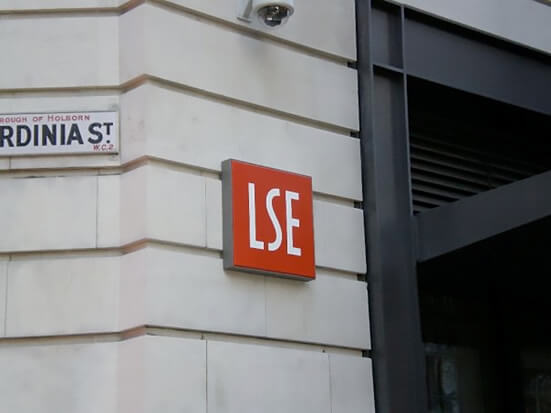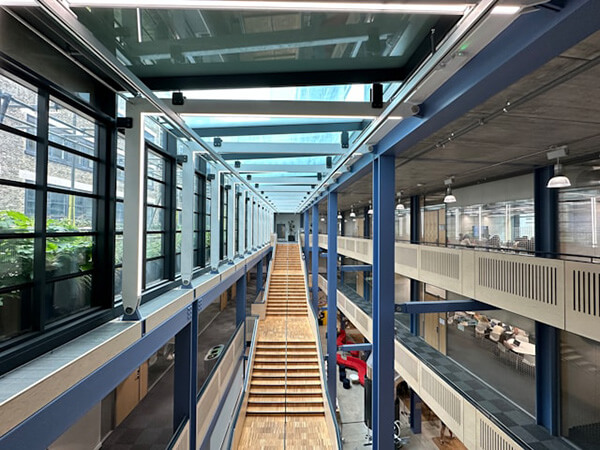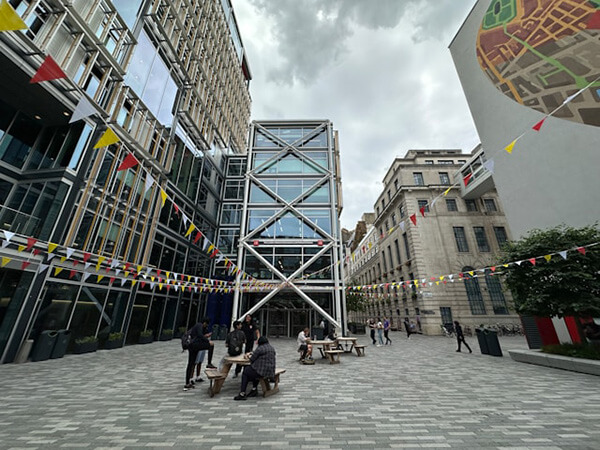Study Abroad at the London School of Economics
A Year of Learning and Immersion in England Among the International Elite
By Chao Huang

|
Study Abroad at the London School of Economics (LSE).
Photo by Chao Huang.
|
During the first few weeks of studying at the London School of Economics, the phrase I heard the most was: “If you don’t understand this concept, you should quit the class.” Though this advice may seem unnecessarily intimidating, I believe it describes the LSE experience fairly well.
As a world-class institution, the London School of Economics and Political Science features bright and well-informed students, distinguished professors, and generally tough yet interesting courses. Of course, the LSE is much more than just academics. In the nine months I spent there, I fell in love with its wonderful central location, the extremely diverse social scene, and with life in London.
The General Course at the London Schools of Economics
I found out about the existence of the LSE General Course Programme almost entirely by accident. When I first arrived at Brandeis University, my mind was set on studying abroad in Paris. One day in November, as I scanned through the approved list of programs on the Brandeis study abroad website, I decided to look at locations in England just to see what was available.
I jumped from my seat in excitement when I saw the words “London School of Economics” on the page. As an economics major, I knew that the LSE was home to many important economic thinkers and a source of much research and scholarship. I immediately decided to apply to the General Course, forgetting about all other programs in the process. Thankfully, I was accepted, and I embarked on my journey.
The General Course Programme gives approximately 300 foreign students, most of whom are American, the chance to study at the LSE for one academic year. However, unlike many other study abroad programs, we felt very integrated into the university community. Not only did we attend the same classes, but the LSE also guaranteed accommodation in one of their many halls located around central London. This allowed us to live with and befriend students of other nationalities, rather than keep to ourselves, as do some American students when studying abroad. I had the good fortune of living in Northumberland House, a recently renovated hotel-like hall a minute’s walk away from Trafalgar Square on one side and the Thames River on the other. As soon as I settled in, I knew that I had made the right decision and that I would not regret the experience.

|
|
A fountain on iconic Trafalgar Square in the center of London.
|
A Focus on Academics
No description of the LSE could possibly be complete without discussing academics. Its reputation for excellence is well earned, and its students generally work very hard throughout the year. The LSE’s academic system was very different from American colleges, and apparently also differed largely from many British universities.
The academic calendar at the LSE is divided into three terms: Michaelmas (October to December), Lent (January to March), and Summer (April to June). Each of the first two contain ten weeks of classes and lectures, while the three different sessions of Summer term features two weeks of classes then the beginning of exam period, which can last till mid-June. The pace of teaching tends to be very fast, as each course tends to have only one or two hours of lecture and one hour of class (seminar) each week. As my professors kindly reminded me, failing to understand certain concepts can cause students to fall behind terribly.
As a result of the fast pace and smaller number of teaching hours, I found myself spending much more time reading than I did in my home university. Lecturers cover only the most basic information, while teaching assistants expect students to complete at least the essential readings assigned for discussion during class. Most learning occurs outside of class, and American students who hope to succeed should anticipate a larger amount of reading than they are normally used to. In retrospect, I wish I had known to take notes on reading throughout the year, as readings became very difficult to remember by the end of the year.
For most classes, a student’s grade is determined entirely by the final exam in May or June. This may seem daunting at first, yet I felt that it actually helped lift some pressure off of my work for most of the year. The essays and problem sets assigned in class had no real impact, though they helped me prepare for the exams.
Of course, this also meant that from April till June, the university enters an intense study period where students tend to crowd the library, the cafeterias, and any other areas with tables and chairs during most of the day. Stress and tension tends to run high; I heard of incidents of students fighting because someone ruffled pages too loudly, as well as more serious cases of attempted suicides. By budgeting a large number of hours each day towards studying, I managed to avoid any mental issues, though I studied far harder than I ever had in the past.

|
|
An interior hall at the London School of Economics.
|
The Student Body and Social Events at LSE
Just because LSE students are serious about academics does not mean that they are unapproachable or unable to enjoy themselves. Over the course of the year I was very impressed with both their intelligence and their openness. LSE students are extremely diverse, whether by their nationality, their beliefs, their preferences, and their strengths.
One characteristic common to almost all students is their intensity. Within a few hours of meeting others, I had already heard discussions regarding world politics, election systems, and education reform. LSE students are generally unafraid to state their opinions and try to stay informed. This sometimes went to a ridiculous extent, as my hall eventually had to help individuals keep their subscriptions of The Economist safe after students stole them from our shared mailboxes. There are also some students who have highly inflated opinions of themselves and look down on others; however, they occur no more often than at most American universities.
I made most of my friends within a few weeks, many of whom lived in my hall, attended my classes, or participated in my clubs and societies. My group of friends and acquaintances was as diverse as the student body itself, and included some students from as far away as Burma and Kenya. However, one important fact to note is that foreign (non-British) students, who comprise the majority of the student body, do tend to remain within national cliques. This is especially obvious among Chinese and Indian students, though even Americans have a tendency to befriend mostly other Americans. However, at no point did I feel that there were students who were unapproachable and unfriendly towards me.
The university also offers many social events that appeal to almost all of its students. The first week before the start of courses is Fresher’s Week, where students can attend information sessions and speaker events, sign up for clubs and societies, visit pubs and clubs around the city, and enjoy themselves in general without having to worry about schoolwork. Every Friday, the LSE Student Union hosts Crush, a student dance party including a full bar with reasonably priced drinks. The Student Union also runs a monthly comedy night, where relatively unknown though generally talented comedians perform for several hours. I personally attended these only a few times, as the city offered far more appealing entertainment options.
One of the best ways to meet fellow students with similar interests is participation in student societies. The LSE has hundreds of registered societies representing different nationalities, political beliefs, religions, causes, and interests. However, unlike most American universities, all societies are required to charge at least a pound for membership. Students often find themselves signing up for many more groups than they care to actually participate in. In fact, I spent ten pounds to register for five or six clubs, though for most of the year I was only an active member of two or three. However, I greatly enhanced my LSE experience through serving as an officer in the Grimshaw Club and participating in the Debate Society. Not only did I gain the experience of running an educational trip to Geneva for Grimshaw, but I also learned to debate in the British Parliamentary format and even won some debating tournaments within the LSE.

|
|
Students on the international campus of the LSE.
|
Saving Money in Expensive London
London is often known as a very expensive city for tourists and travelers. Indeed, compared to smaller nearby English cities, London has much higher prices for food, entertainment, transport, and most other commodities. Though I never managed to save as much money as I hoped, I eventually discovered many methods to keep myself from splurging too much.
Housing is most likely the largest source of expense that cannot be avoided. I chose early on to live in student accommodations, and had the good fortune of being selected into the modern and comfortable Northumberland House, where I lived in a double room with its own bathroom for about £215 a week. I would heavily advise living in an LSE hall, as they are generally cheaper and more conveniently located.
Food is usually also a large part of any budget, and can be made larger by careless spending. Finding a practical supermarket can be difficult within the city, as the type of large chain supermarkets with great deals tend to be at least a 20-minute bus trip away. For the most part, I bought my food at nearby Tesco Metro and Sainsbury’s Central supermarkets, which offer a large enough diversity of foods and ingredients for most cuisines. I managed to save quite a bit of money by buying supermarket brand items, which in the U.K. generally are of decent quality. Almost all food items not including fresh fruits and vegetables could be substituted with an equally tasty Tesco Value or Sainsbury’s Basics version.
Eating out in restaurants can be far more expensive than in the U.S., whether for lunch or dinner. However, after some searching I discovered many deals where each person can spend no more than ten pounds for a meal. One neighborhood I found particularly appealing is Brick Lane, a street lined with South Asian restaurants eager to bring more business. Thanks to their system of offering potential customers deals, 10-15 pounds should easily buy an appetizer, a curry, rice, a drink, and a dessert.
Here is the most current general cost of living in expensive London.

|
|
One of many international markets where students from around the world gather in London.
|
Entertainment is another indispensable cost where I learned to save. London pubs and clubs charge similar amounts for drinks as their American counterparts, though free club entry is not difficult provided one is part of a fairly large social group (without too many men). During the day, the city offers a wide array of theaters, cinemas, and museums. Many large museums such as the British Museum or the National Gallery are free of charge and are full of interesting exhibits where I spent a large part of my day. More importantly for me, as a movie-buff, I wanted to make sure I could see as many films as possible. Fortunately, I discovered the Prince Charles Cinema in Leicester Square, where a subscription for a year’s membership entitled me to watch films for as little as couple of pounds each! Thanks to this cinema, I managed to watch far more films in London than I ever had in the US.
Many American students will also use studying abroad to travel, as I did within London, around England, and in mainland Europe. Transportation can be costly for those unwilling to walk or take buses. I personally had a high tolerance for walking and often toured the city without paying for public transportation. However, researching bus routes can be a great way to save money, as riding buses is always cheaper than using the Underground, which charges more based on distance traveled. The Transport for London (TFL) website provides plenty of guidance for every method of public transportation.
Traveling in England or Europe obviously required more funds, including both transportation and lodging. English trains are fairly reliable, and cheap deals can often be found on National Rail. I once managed to take advantage of a deal that allowed me to visit York, Durham, and Glasgow for nine pounds per train. Buses are also available and tend to be cheaper though slower. To travel to Europe, I used both Easyjet, where most one-way flights cost no more than 40 pounds, and the Eurostar, where I received discounted student prices. In order to get the best deals for lodging and transport, I recommend spending some time browsing and comparing various websites. However, I felt that due to the workload at the LSE, General Course students tend to travel less than many other Americans studying abroad.
Conclusions and Words of Advice
If I were given another opportunity to attend the General Course (for free), I most certainly would. Despite all the challenges of the LSE system and the amount of work throughout the year, I felt that I never learned more from both courses and fellow students than I did during my year abroad. Though it was neither the first time I had visited nor even the first time I had lived in a different country, I learned to adapt to a different kind of life from the one I had in the United States. I can say in all honesty that my year abroad was the greatest year of my life.
Some additional advice for potential General Course students:
1. Don’t let classes get in the way of your education. When studying abroad, big parts of learning can occur outside classes, whether immersing oneself in local culture or discovering new foods, ideas, pastimes, or other interesting facts. Although at the LSE coursework does require a lot of time, I did always find time to go around and I made every effort to experience local life.
2. In terms of academics, do try to keep up. One positive attribute to the LSE finals is that students only have to answer around four questions out of many more topics, meaning that students should know about six topics relatively well in order to be prepared for the exam. If you plan on doing reasonably well academically, you need to work hard on a few topics and make sure you understand them.
3. Mingle. I have seen many American students make friends practically with only other Americans. I tried very hard to befriend people from various nationalities and backgrounds, and I believe that my experience was all the better for it.
Chao Huang is a double major in International and Global Studies and Economics at Brandeis University in Waltham, Massachusetts. Chao was originally from Beijing, China, and spent the first 11 years of his life in various places in China and Europe (Spain, France, Switzerland, and the U.K.). Since then Chao has lived in the United States, first in Northborough, Massachusetts and Edison, New Jersey.
|
